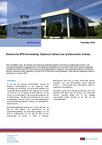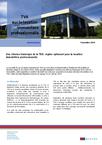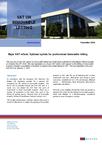Tax Alert - Immovable letting - VAT options
Major VAT reform: Optional system for professional immovable letting
The new law on the VAT option on immovable letting has finally been published in the Belgian Official Gazette on October the 25th 2018. This new legislation is a major VAT reform with respect to the letting of immovable property whereby a possibility is foreseen to subject immovable letting to VAT. The new legislation will come into force on January 1, 2019.
PREVIOUSLY
In accordance with the European VAT Directive, the Belgian VAT legislation provides for a general VAT exemption for the letting of immovable property. The lessor must in principle exempt rent from VAT and, as a result, may not deduct the VAT from the costs of investments in those immovable property. There are a number of exceptions to this basic rule, such as the letting of parking spaces, financial lease of immovable property, letting of warehouses, business centers, etc.).
VAT-taxable entrepreneurs and their advisors then went in search of alternatives to subject the posting of immovable
property to VAT, with the aim of deducting VAT on their investments and costs. Alternatives were found in active real estate, establishment of a VAT unit between affiliated parties, .... Unfortunately, these alternatives often lead to undesirable side effects. Moreover, many neighbor EU Member States do provide an optional VAT system for the letting of immovable property, which puts Belgium at a disadvantageous competitive position in terms of property taxation.
MAJOR VAT-REFORM
Ultimately, in the summer of 2017, the Belgian government announced a major VAT reform to remedy this situation and to give the real estate sector a boost. The reform essentially provides for the possibility of placing the (professional) letting of immovable property under VAT. Naturally, this option has the positive consequence that the owner / lessor can deduct the VAT from the construction, refurbishment and maintenance costs.
The new regulation involves 3 major changes:
- optional VAT on B2B immovable letting
- VAT on short term rentals
- extension of the scope on letting of warehouses
OPTIONAL VAT ON B2B IMMOVABLE LETTING
The first, and most ambitious pillar of the reform includes the introduction of the option to subject professional immovable letting to VAT.
This option however could only be exercised if four main requirements are met.
- The letting must relate to an immovable property or a part of the immovable property.
- This (part of the) immovable property may solely be used in the framework of the economic activity of the lessee, which provides him the qualification of a taxable person. This implies that purely passive holdings, public bodies,... as well as letting for private use is excluded from this optional regime. On the other hand, to which extent the lessee is entitled to exercise its right to deduct is irrelevant.
- Both parties have to express their intention to opt for the VAT regime in their written agreement.
- The immovable property has to be considered as new as described in VAT legislation.
This new regime will enter into force as of January 1st, 2019 and can be applied on “newly incorporated” or "fundamently renovated old" immovable property as from October 1st, 2018.
It is important to note that the optional regime can not be applied to current letting agreements or letting agreements that have commenced before January 1st 2019. Only the buildings for which the due date of the VAT of the first 'stone set' takes place after October 1st 2018 , qualify. The lesser may not yet have received an invoice for the construction works of the building before October 1st 2018.
Preparatory work such as architects, demolition works, can already take place before October 1st 2018.
Fundamentally renovated old buildings are also eligible for the new system, insofar as the renovation works take place after October 1st 2018 and there are drastic changes to the nature / structure of the building ("renovation").
When the conditions are met, the lessor/owner and tenant must indicate their option to apply VAT in the letting agreement concluded between them. There is no separate notification obligation with regard to VAT administration.
SHORT TERM RENTALS
The second main novelty introduced by the VAT reform is in the context of short term rentals. Different from the foregoing, short term rentals will be subject to a mandatory taxation, so there will be no need to exercise a joint option.
From January 1st on, short-term rentals must be taxed with VAT. It is therefore not an optional system.
The legislation considers as short term a period which not exceeds 6 months.
Moreover, the letting of immovable property used for habitation or letting within the social-cultural sector will also be excluded of the mandatory application of VAT. Moreover, the letting of immovable property to not-for-profit organizations are also excluded from this regime.
In particular, the new regulation targets the rental of stands in exhibition halls, the rental of conference rooms, hotels, etc.
EXTENSION SCOPE LETTING OF WAREHOUSES
The third cornerstone will introduce an extension of the scope of warehouse letting.
Up till now, the letting of warehouses was subjected to VAT if 90% of the ground surface / volume is used as storage space. As of October 1st, 2018, this threshold will be lowered to 50%. Thus all letting agreements will be subject to VAT as long as the building is used primarily as storage space (>50%).
Whereas existing rental agreements cannot be modified in a rental agreement subject to VAT in the scope of the professional B2B lease, it is foreseen that existing agreements may be converted to an agreement subject to VAT should it appear that, on October 1, 2018, all conditions to subject to agreement to VAT are met. The addendum can only be drafted on January 1, 2019.
In contradiction to the optional system of immovable rental, it is not a condition here that it must be a new building.
Once the option is exercised, it will have to be irrevocably applied for the duration of the agreement.
CONCLUSION
There is no doubt that the new legislation may bring opportunities to the real estate sector. As lessors will be entitled to deduct input VAT on the construction and maintenance costs, and so VAT will no longer be a cost-increasing factor.
Even though the new legislation is clear and well structured, there are some pitfalls which should be taken into account in determining whether the new regime can be applied (definition of new buildings, qualification of the tenant, right to deduct historical VAT, ...).
The new regime also introduces the concept of "normal value" (market-rated) as a taxable amount for the levying of VAT.
The current revision period of 15 years for investments in new buildings is extended to 25 years when these buildings are leased under the optional VAT system.
As for the VAT rate, the standard VAT rate of 21% will be applicable in some circumstances, the reduced rates of 6% and 12% can be applied (e.g. social housing, schools, ...). The conditions for the application of the reduced rates have remained unchanged.



